Key takeaways:
- Brainstorming and revising are crucial elements in the composition process, allowing ideas to flow freely and transforming initial drafts into polished pieces.
- Identifying clear writing goals (purpose, audience, format, timeline, skill development) enhances focus and directs efforts towards achieving writing aspirations.
- Seeking feedback from peers fosters growth; embracing constructive criticism and requesting specific insights can lead to significant improvements in writing quality.
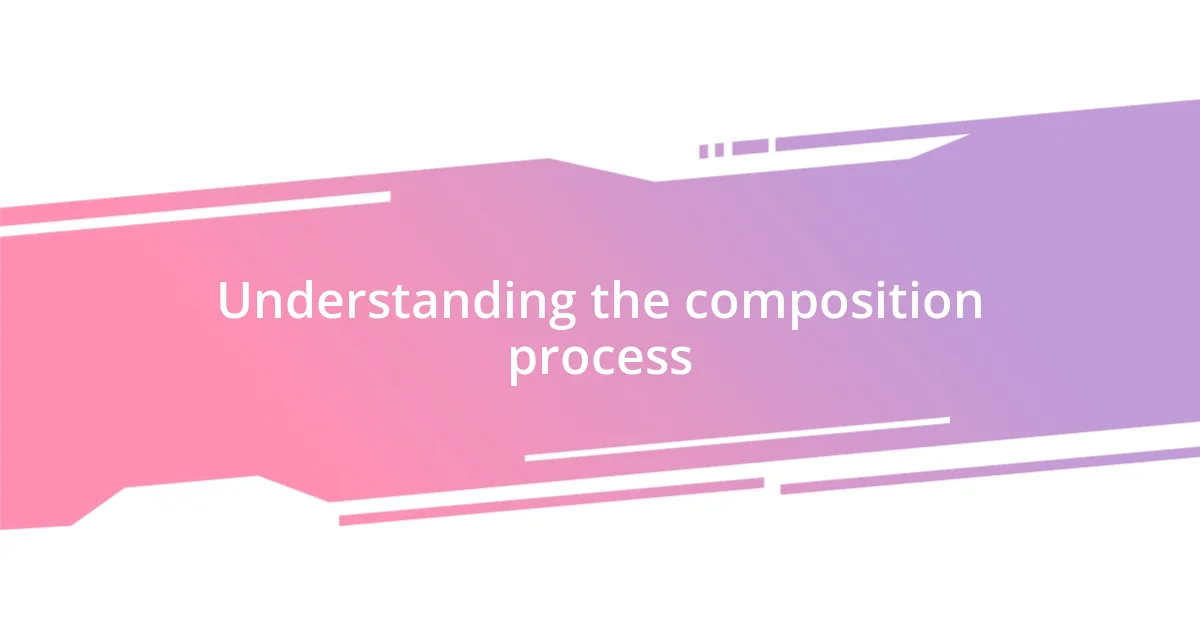
Understanding the composition process
Understanding the composition process is like unraveling a complex puzzle. I often find myself staring at a blank page, wondering where to begin. It’s in those moments of uncertainty that I’ve learned the importance of brainstorming—just letting my thoughts spill out, without worrying about structure or grammar. This free flow of ideas can lead to unexpected insights that guide my writing.
Another aspect I’ve come to appreciate is revising. Initially, I used to dread it. But over time, I recognized that the revision stage is where my pieces truly come to life. Have you ever noticed how a simple tweak can completely change the tone of a sentence? I remember revising a particularly challenging paragraph, and after hours of rephrasing, it morphed from clunky to concise, which was immensely satisfying.
The final step for me often involves receiving feedback, which can feel vulnerable but essential. When I share my drafts with trusted peers, I open myself up to constructive criticism that I can use to refine my work. Have you felt that rush of excitement when someone else sees your potential? That’s the magic of collaboration in the composition process, reminding me that writing doesn’t have to be a solitary journey.

Identifying your writing goals
Identifying your writing goals can be a transformative experience. I remember the first time I sat down to articulate what I truly wanted to achieve with my writing. It felt almost like staring into a mirror and seeing myself for the first time. I realized that having clear goals didn’t just provide direction; it ignited my passion. Setting specific targets helps me stay focused, whether I’m drafting a blog post or working on a novel.
Here are some aspects to consider when defining your writing goals:
- Purpose: What do you want to achieve? Is it to inform, entertain, or persuade?
- Audience: Who are you writing for? Understanding your audience shapes your tone and style.
- Format: Will it be a short story, an article, or perhaps a personal essay? The format can dictate the way you approach your writing.
- Timeline: How much time can you realistically dedicate to your writing? Setting a timeline keeps me accountable.
- Skill Development: Are there specific writing skills you want to improve? For instance, I once set a goal to enhance my dialogue writing, which was incredibly rewarding.
By refining these elements, I’ve found that my writing becomes more intentional and fulfilling, guiding me toward my ultimate literary aspirations.
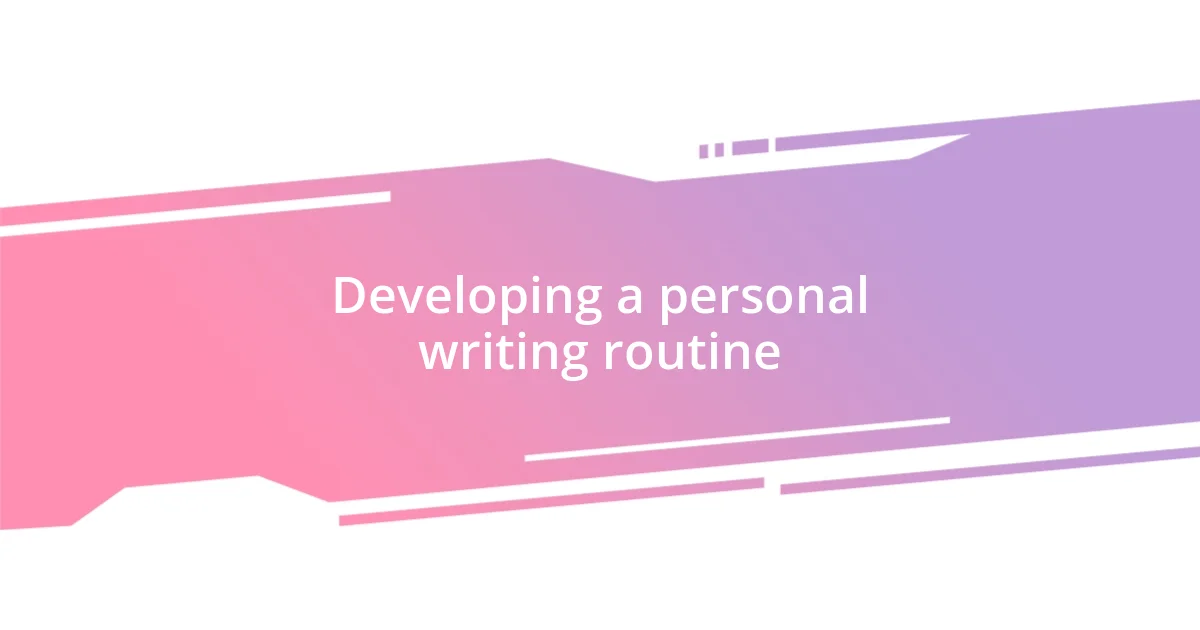
Developing a personal writing routine
While developing a personal writing routine, I’ve discovered that consistency is key. When I began setting aside specific times for writing, it felt liberating. At first, it was challenging to carve out those hours amidst a busy schedule, but once I committed, I noticed a shift in my productivity. I started with just 30 minutes daily, and gradually increased it. Can you imagine the sense of accomplishment that comes from watching your words accumulate day after day?
In addition to consistent timing, I’ve found creating a conducive environment immensely beneficial. I often move to a cozy corner in my home, free from distractions, with my favorite mug of tea by my side. This simple act of creating a writing space can dramatically enhance focus and creativity. You’d be surprised how much a well-arranged desk can impact the writing flow. What’s your favorite writing spot? Mine has become a sanctuary for my thoughts and ideas.
Lastly, I emphasize the importance of reflection after each writing session. Taking a few minutes to jot down what worked and what didn’t has been immensely enlightening. There are nights when I sit back and realize that certain techniques helped my ideas flourish while others led to frustration. This practice not only informs my future sessions but also builds a richer understanding of my progress. Have you ever reflected on your writing journey? These insights are what fuel my growth and keep my passion alive.
| Routine Element | My Experience |
|---|---|
| Consistent Timing | Setting daily time slots transformed my productivity, leading me to write more effectively. |
| Writing Environment | Creating a distraction-free zone made me feel focused and inspired, enhancing my creativity. |
| Session Reflection | Reflecting on each session helped me understand my writing patterns and fostered personal growth. |
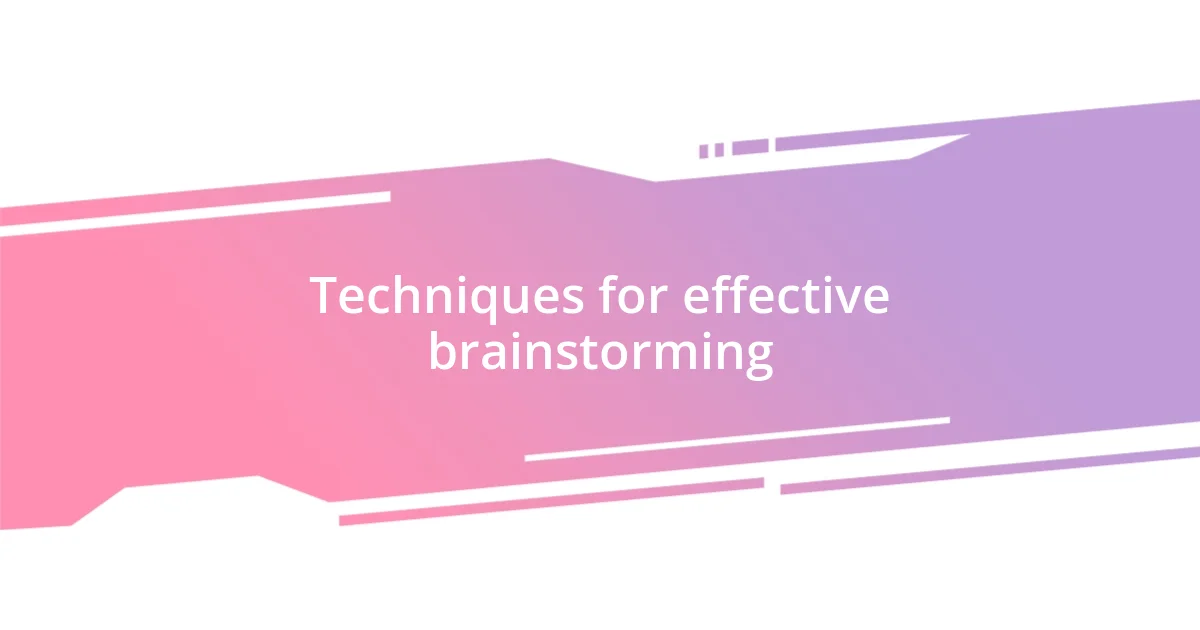
Techniques for effective brainstorming
Brainstorming can feel daunting at times, but I’ve found that freeing myself from conventional constraints often leads to the best ideas. One of my favorite techniques is mind mapping. I remember sitting in a coffee shop once, doodling a central idea in a circular shape and letting my thoughts branch out like tree limbs. It transformed a simple concept into a vibrant web of interconnected ideas, allowing me to see connections I hadn’t considered before. Have you ever tried this visual approach? It can really enhance clarity and spark creativity.
Another method that has proven invaluable in my brainstorming sessions is using prompts. Sometimes, I’ll start my day by opening a journal filled with random prompts or quotes that inspire me. One chilly morning, I stumbled upon a phrase about change, and it triggered a flurry of memories and ideas. It taught me that the right prompt can act like a key, unlocking hidden thoughts and feelings, creating a pathway towards authentic content. What type of prompts resonate with you? You’ll be amazed at what they can unravel.
Collaborative brainstorming is also something I cherish. Engaging in discussions with fellow writers has such a dynamic energy. I recall a lively group brainstorming session where we tossed around ideas like a game of catch. Each person’s perspective added depth and diversity, leading to concepts I never would have arrived at alone. It made me realize how powerful collaboration can be. Have you ever gathered friends or colleagues to brainstorm? Opening up to others can light the spark of inspiration in unexpected ways.

Strategies for building strong arguments
Building strong arguments is an art that I’ve honed over time. One strategy that has consistently worked for me is to clearly define my thesis statement upfront. I remember a time when I crafted an essay without a precise thesis, only to find myself lost in a sea of ideas. It hit me then: a strong thesis acts like a guiding star, steering my thoughts and providing clarity. Have you ever felt adrift in your writing? A solid thesis keeps you anchored.
Another key tactic I’ve embraced is providing ample evidence to support my claims. I tend to gather data, quotes, and examples that validate my arguments. For instance, in a recent debate about climate change, I didn’t just express my opinions; I backed them up with statistics and expert testimonies. This evidence didn’t just enhance my credibility—it fueled my passion, transforming my writing into a powerful call for action. Think about it: how much more persuasive do you feel when your arguments are supported by facts?
Lastly, I focus on addressing counterarguments. Early in my writing journey, I overlooked this aspect, but I’ve learned that anticipating opposing views is crucial. It’s like preparing for a friendly tennis match; understanding how your opponent plays helps you strategize better. When I acknowledged counterarguments in my papers, my writing became more nuanced and persuasive. What’s your take on this? Engaging with different perspectives not only strengthens your argument but enriches your overall message.
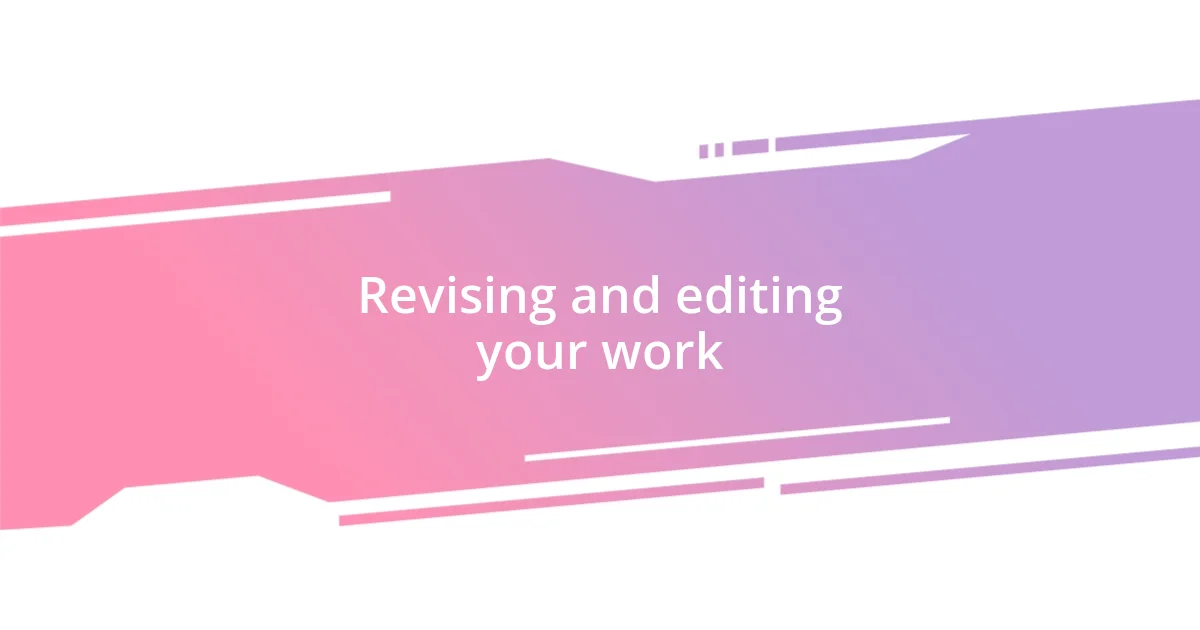
Revising and editing your work
Revising and editing your work can feel like a chore, but I view it as an opportunity for growth. When I approach editing, I often take a break after completing a draft. I remember finishing a story late one night and reading it again the next morning with fresh eyes. Those extra hours made all the difference; I could spot awkward phrases and areas that needed more clarity. Have you ever given your work some space? It can transform your perspective and show you aspects you might have missed.
I also find it helpful to read my work aloud. Some time ago, while tackling a particularly tricky paragraph, I stumbled over my own words. That’s when it hit me—if I’m struggling to say something out loud, my readers might too. This simple practice not only reveals awkward phrasing but also highlights the rhythm and flow of my writing. Isn’t it fascinating how the sound of language can reveal hidden issues?
Lastly, I tend to seek feedback from trusted friends or fellow writers. In one memorable instance, a mentor pointed out how a section of my piece felt disjointed. Initially, I was defensive, but after reflecting, I realized he was spot on. Engaging with others might seem intimidating, but it can lead to enlightening breakthroughs. How do you feel about sharing your drafts? Sometimes, a second pair of eyes can illuminate pathways to refinement you hadn’t considered.
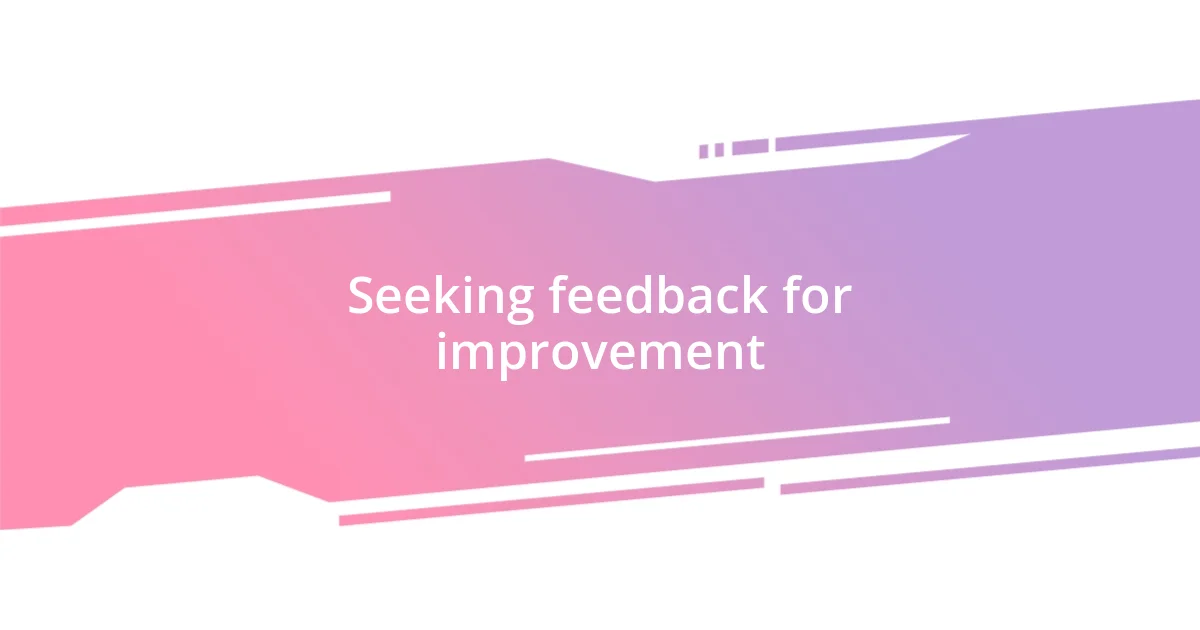
Seeking feedback for improvement
Seeking feedback is essential for growth in any writer’s journey. I remember a workshop where we exchanged drafts, and I was amazed at the fresh insights my peers provided. One friend pointed out an outdated reference in my piece that I had completely overlooked. Isn’t it interesting how others can spot what’s right in front of us? Their perspective often helps me see my work in a new light.
I have learned not to take feedback personally; it’s really about honing my craft. Once, I received critiques on a poem that left me feeling vulnerable. But as I sat with their comments, I discovered ways to enhance the imagery and emotion within my verses. By embracing constructive criticism, I transformed my initial disappointment into inspiration. How do you handle feedback? It can feel daunting, yet that discomfort often paves the way for breakthroughs in our writing.
Moreover, I find it helpful to request specific feedback rather than vague impressions. When I asked a colleague for help with clarity in a technical report I had written, he provided detailed suggestions that illuminated gaps I hadn’t even noticed. This focused approach not only made my writing better but also fostered an open dialogue about our ideas. Have you ever tried this? Direct questions can unlock deeper insights and fuel a collaborative spirit, making the feedback process much more enriching.












